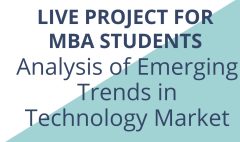Ethical Considerations in R&D
Ethical Considerations in R&D
The ethical frontiers of R&D with our comprehensive guide, emphasizing the pivotal role of MBA graduates in upholding integrity, transparency, and social responsibility in research practices.
The realm of Research and Development (R&D) is not just a crucible of innovation but also a landscape rife with ethical considerations. As R&D efforts push the boundaries of knowledge and capabilities, MBA graduates stepping into this domain must be prepared to confront and navigate numerous ethical dilemmas. This responsibility extends beyond compliance, encompassing a commitment to integrity, social responsibility, and the broader implications of scientific progress.
The Ethical Imperative in R&D
R&D, especially in high-stakes fields like biotechnology, AI, and pharmaceuticals, can present profound ethical challenges. The responsibility of decision-makers to consider societal, environmental, and moral implications of their innovations is paramount.
Integrity and Transparency: Pillars of Ethical R&D
Integrity and transparency form the bedrock of ethical research. This involves honest reporting of research data, disclosure of potential conflicts of interest, and transparency about the research’s sponsors and objectives.
Social Responsibility: The Broader Impact of Innovation
MBAs must consider the societal implications of R&D. This includes assessing the environmental impact, potential misuse, long-term consequences, and the overall benefit-harm balance of new technologies or discoveries.
Informed Consent and Privacy: Respecting Participants and Data
In any research involving human participants, informed consent is a fundamental requirement. Additionally, stringent measures must be in place to protect the privacy and confidentiality of participant data.
Regulatory Compliance: Navigating Legal Frameworks
R&D activities often fall under strict regulatory scrutiny. Compliance with legal standards, industry guidelines, and international norms is non-negotiable and requires a robust understanding of the applicable laws and regulations.
Essential Resources and Platforms
- The Office of Research Integrity (ORI): Offers resources related to the responsible conduct of research. (https://ori.hhs.gov/)
- World Conference on Research Integrity: Provides information on global efforts to promote research integrity. ( https://wcri2023.org/)
- Ethical Research Involving Children (ERIC): Offers comprehensive resources on ethical research practices involving children. ( https://childethics.com/)
- PubMed: A searchable database of biomedical literature, including publications on research ethics. ( https://pubmed.ncbi.nlm.nih.gov/)
- European Network of Research Ethics Committees (EUREC): Provides information and resources related to research ethics committees in Europe. ( http://www.eurecnet.org/index.html)
Conclusion
For MBA graduates venturing into R&D, maintaining an ethical compass is as crucial as driving innovation. As we continue to advance into uncharted territories, the role of ethical stewardship has never been more critical. By embedding integrity, responsibility, and empathy into the very fabric of R&D, we ensure that progress aligns with humanity’s best interests.








